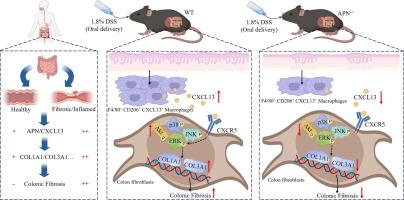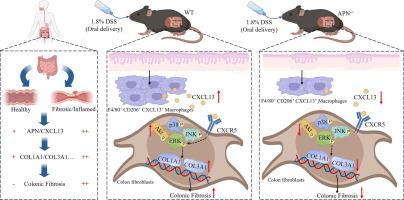脂联素缺乏通过抑制CXCL13的产生来预防慢性结肠炎相关的结肠纤维化
IF 13
1区 综合性期刊
Q1 MULTIDISCIPLINARY SCIENCES
引用次数: 0
摘要
结肠纤维化是炎症性肠病(IBD)的长期并发症,常导致功能损害、肠梗阻和手术。脂联素(APN)是一种来源于脂肪细胞的脂肪因子,在纤维化调节中发挥多效作用,取决于组织和细胞类型特异性或疾病背景,但其在结肠纤维化中的作用尚不清楚。目的探讨APN在慢性结肠炎相关结肠纤维化中的作用及其机制。方法在GEO数据库、UC患者结肠组织、dextran sulfate sodium (DSS)诱导的雄性野生型(WT)和APN-/-小鼠、重组CXCL13蛋白处理的小鼠L929和人CCD-18Co成纤维细胞以及CXCL13 shRNA感染的WT小鼠的结肠纤维化实验中进行研究。结果apn在UC患者结肠组织中高表达,与结肠镜评分、结肠纤维化标志物COL1A1、COL3A1呈正相关。APN缺乏可通过下调结肠组织中胶原酶积累及TGF-β、α-SMA、COL1A1、COL3A1、MMP-9的表达,显著改善小鼠慢性结肠炎诱导的结肠纤维化。转录组学显示APN缺乏主要影响细胞因子-细胞因子受体的相互作用,尤其是CXCL13信号传导。后续研究发现,APN缺乏通过削弱Akt磷酸化,显著降低了结肠F4/80+CD206+CXCL13+巨噬细胞的数量。进一步的实验证实,CXCL13通过激活p-Akt、p-p38、p-ERK和p-JNK,显著提高小鼠α-SMA和COL1A1在小鼠和人成纤维细胞中的表达。此外,用shRNA抑制CXCL13可显著改善dss诱导的慢性结肠炎小鼠的结肠纤维化。免疫组化分析显示,CXCL13在UC患者结肠组织中高表达,与APN、COL1A1、COL3A1呈正相关。结论apn参与结肠纤维化的进展,并可通过调节结肠内CXCL13的分泌而加重结肠纤维化,为结肠纤维化的病理生理研究提供了潜在的新视角。本文章由计算机程序翻译,如有差异,请以英文原文为准。


Adiponectin deficiency prevents chronic colitis-associated colonic fibrosis via inhibiting CXCL13 production
Introduction
Colonic fibrosis is a long-term complication of inflammatory bowel disease (IBD), often leading to functional impairment, intestinal obstruction, and surgery. Adiponectin (APN) is an adipokine derived from adipocytes that plays a pleiotropic role in fibrosis regulation, depending on tissue and cell type specific or disease context, but its role in colonic fibrosis remains unclear.
Objective
To explore the role and involved mechanism of APN in chronic colitis-associated colonic fibrosis.
Methods
Studies were performed in GEO database, colonic tissues of UC patients, dextran sulfate sodium (DSS)-induced colonic fibrosis in male wild-type (WT) and APN-/- mice, mouse L929 and human CCD-18Co fibroblasts treated with recombinant CXCL13 protein, and colonic fibrosis in WT mice infected with shRNA of CXCL13.
Results
APN was highly expressed in the colonic tissues of UC patients and positively correlated with the colonoscopy score and colonic fibrosis markers COL1A1 and COL3A1. APN deficiency significantly improved chronic colitis-induced colonic fibrosis in mice with down-regulating collagenase accumulation and expressions of TGF-β, α-SMA, COL1A1, COL3A1, and MMP-9 in colonic tissues. Transcriptomics showed that APN deficiency mainly affected cytokine-cytokine receptor interactions, especially CXCL13 signaling. Follow-up studies showed that APN deficiency significantly decreased the number of colonic F4/80+CD206+CXCL13+ macrophages by weakening Akt phosphorylation. Additional experiments confirmed that CXCL13 notably increased the expressions of α-SMA and COL1A1 in mouse and human fibroblasts by activating p-Akt, p-p38, p-ERK, and p-JNK. Moreover, inhibiting CXCL13 with shRNA significantly ameliorated colonic fibrosis in mice with DSS-induced chronic colitis. Immunohistochemistry analysis revealed high expression of CXCL13 in the colon tissues of patients with UC, showing a positive correlation with APN, COL1A1, and COL3A1.
Conclusion
APN contributes to the progression of colonic fibrosis and can exacerbate this condition by regulating the secretion of CXCL13 in the colon, offering potential new perspectives on the pathophysiology of colonic fibrosis.
求助全文
通过发布文献求助,成功后即可免费获取论文全文。
去求助
来源期刊

Journal of Advanced Research
Multidisciplinary-Multidisciplinary
CiteScore
21.60
自引率
0.90%
发文量
280
审稿时长
12 weeks
期刊介绍:
Journal of Advanced Research (J. Adv. Res.) is an applied/natural sciences, peer-reviewed journal that focuses on interdisciplinary research. The journal aims to contribute to applied research and knowledge worldwide through the publication of original and high-quality research articles in the fields of Medicine, Pharmaceutical Sciences, Dentistry, Physical Therapy, Veterinary Medicine, and Basic and Biological Sciences.
The following abstracting and indexing services cover the Journal of Advanced Research: PubMed/Medline, Essential Science Indicators, Web of Science, Scopus, PubMed Central, PubMed, Science Citation Index Expanded, Directory of Open Access Journals (DOAJ), and INSPEC.
 求助内容:
求助内容: 应助结果提醒方式:
应助结果提醒方式:


